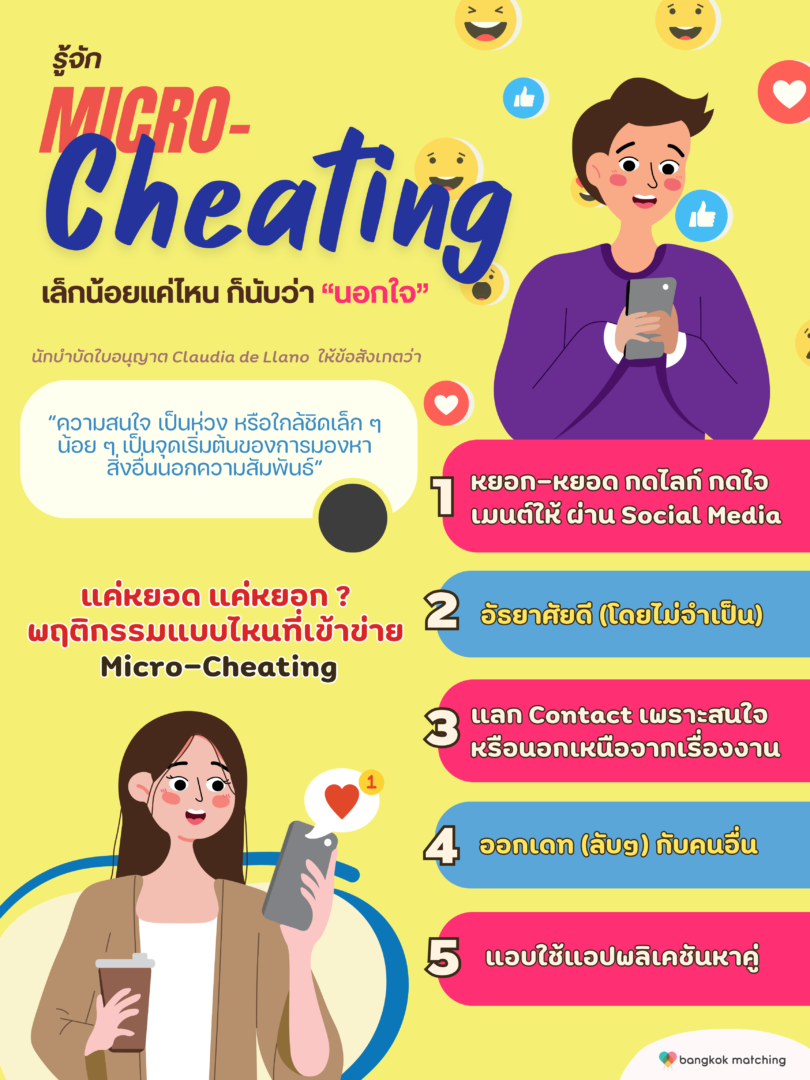Understanding Micro-Cheating: What Subtle Actions Constitute Infidelity?
Table of Contents
ToggleUnderstanding Micro-Cheating: When Small Actions Become Emotional Betrayal
In today’s world, infidelity no longer manifests in obvious ways as it once did. Instead, it often appears in subtle, seemingly insignificant actions that can have profound emotional consequences on a relationship. This phenomenon is known as Micro-Cheating—but what types of minor behaviors actually constitute infidelity?
As a leading high-end matchmaking company, Bangkok Matching is here to provide a comprehensive exploration of Micro-Cheating and help you uncover the truth behind this modern relationship dilemma.
Micro-Cheating: A Small Act with a Big Emotional Impact
Micro-Cheating refers to seemingly harmless behaviors that may not immediately appear as outright infidelity but gradually erode trust and create emotional fractures in a relationship. When the boundary between “friendship” and “betrayal” becomes blurred, these actions can spark intense debates—so much so that Micro-Cheating has become a highly controversial topic across social media
.
Renowned marriage and family therapist Claudia de Llano explains that expressing emotional attentiveness to someone outside of a committed relationship—whether through excessive emotional investment, deep personal interest, or even heightened physical closeness—can be the first step toward crossing relational boundaries. Even if there is no explicit romantic intent, these actions can be seen as seeking emotional fulfillment outside of an existing relationship, which, from a matchmaking perspective, is a form of infidelity.
At Bangkok Matching, we believe that understanding the nuances of Micro-Cheating is essential for maintaining strong, trusting relationships. Stay with us as we dive deeper into this complex and thought-provoking issue.

Why Is Micro-Cheating So Common Today?
In the modern era, connecting with others has never been easier—thanks to the internet and smartphones. The boundaries of infidelity have expanded far beyond what they used to be, becoming increasingly subtle and complex. Actions that seem insignificant, such as liking or reacting to an Instagram Story, may sometimes carry deeper emotional undertones. However, when confronted about these behaviors, common responses often include “It’s just a like” or “I don’t even remember doing it”—minimizing the impact of such actions and making the concerned partner seem overly sensitive or paranoid.
Why Is Micro-Cheating So Prevalent in Today’s World?
Several factors contribute to the rise of micro-cheating in modern relationships:
-
The Influence of Social Media and Online Culture – Strangers can interact with ease, making it simple to initiate conversations, form connections, and even conceal interactions.
-
The Blurred Line Between Being Friendly and Being Unfaithful – Many use friendliness as an excuse to justify behaviors that cross relationship boundaries.
-
Dissatisfaction in a Relationship Without Wanting to Break Up – Some individuals engage in micro-cheating because they are emotionally or physically unfulfilled yet unwilling to end their current relationship.
-
Seeking Excitement – A desire to escape routine and experience new interactions can lead to behaviors that constitute micro-cheating.
Flirting or Just Friendly? What Counts as Micro-Cheating?
Micro-cheating is a gray area in relationships, with no universally agreed-upon definition of how much is too much. However, it’s crucial to remember that every romantic relationship begins with small moments of attraction—which is why even seemingly minor behaviors can be a cause for concern.
Marriage and family therapist Moraya Seeger DeGeare suggests a simple way to evaluate whether an action qualifies as micro-cheating:
-
Are you forming a connection with someone outside your relationship?
-
If your partner did the same thing, would you feel uncomfortable?
If the answer is yes, then the behavior could be considered micro-cheating.
To clarify this further, Bangkok Matching is outlining five common micro-cheating behaviors that can be harmful to relationships.
5 Common Micro-Cheating Behaviors That Can Damage Relationships
1. Showing Interest via Social Media
Engaging with someone frequently on social media—liking, commenting, or sending private messages—may seem harmless, but it often reflects an underlying interest beyond friendship. Common excuses include “It’s just a like” or “I was just being nice”, yet these actions can signal emotional unavailability in a relationship.
2. Using “Friendliness” as an Excuse
Being friendly is natural, but excessive friendliness—such as initiating conversations, offering favors that weren’t requested, or DMing someone for personal reasons—can be a subtle form of micro-cheating. The key difference? Intent. If these interactions fulfill an emotional need that should be met within the relationship, they may be problematic.
3. Exchanging Contact Information with Someone Out of Attraction
Sharing LINE, Facebook, Instagram, or any contact details simply because someone catches your interest—physically or emotionally—can be classified as micro-cheating. These seemingly innocent exchanges often lead to complex relationship conflicts and jealousy over time.
4. Going on “Non-Dates” with Someone You’re Interested In
Many people justify having lunch, coffee, or casual outings with someone they are attracted to by saying, “It’s just a meal with a friend.” However, if there’s an underlying interest, this behavior can create small cracks in a relationship that grow over time.
5. Using Dating Apps “Just for Fun”
This is one of the most serious forms of micro-cheating. Someone in a committed relationship who downloads and uses dating apps—even if they claim it’s just out of curiosity—is actively opening the door to meeting new romantic prospects, which can easily lead to full-scale infidelity.
How to Handle a Partner Who Engages in Micro-Cheating
If your partner exhibits micro-cheating behaviors, even if they haven’t explicitly cheated, their actions can create confusion, insecurity, and a loss of trust in the relationship. Here’s how to address the situation:
-
Observe Their Behavior Closely – Pay attention to subtle changes, such as increased time on social media, secretive behavior, or interactions that feel emotionally inappropriate.
-
Communicate Openly and Directly – If you notice a shift in their behavior, discuss your concerns rationally rather than emotionally. How they respond will help you determine the next steps for your relationship.
-
Establish Clear Relationship Boundaries – After discussing the issue, agree on what behaviors are acceptable and unacceptable. For example, you might set a boundary that following or messaging attractive strangers on social media is not acceptable.
-
Reevaluate the Relationship – If your concerns are dismissed, or if your partner refuses to respect boundaries, it may be time to consider whether the relationship is still right for you.
-
Prioritize Self-Care – If ending the relationship becomes necessary, focus on healing and personal growth by engaging in hobbies, self-improvement activities, and surrounding yourself with supportive people.
At Bangkok Matching, we believe that understanding and setting clear expectations in relationships is key to lasting happiness. If you’re looking for a serious and committed relationship, our expert matchmaking services can help you find a partner who shares your values and respects your boundaries.







